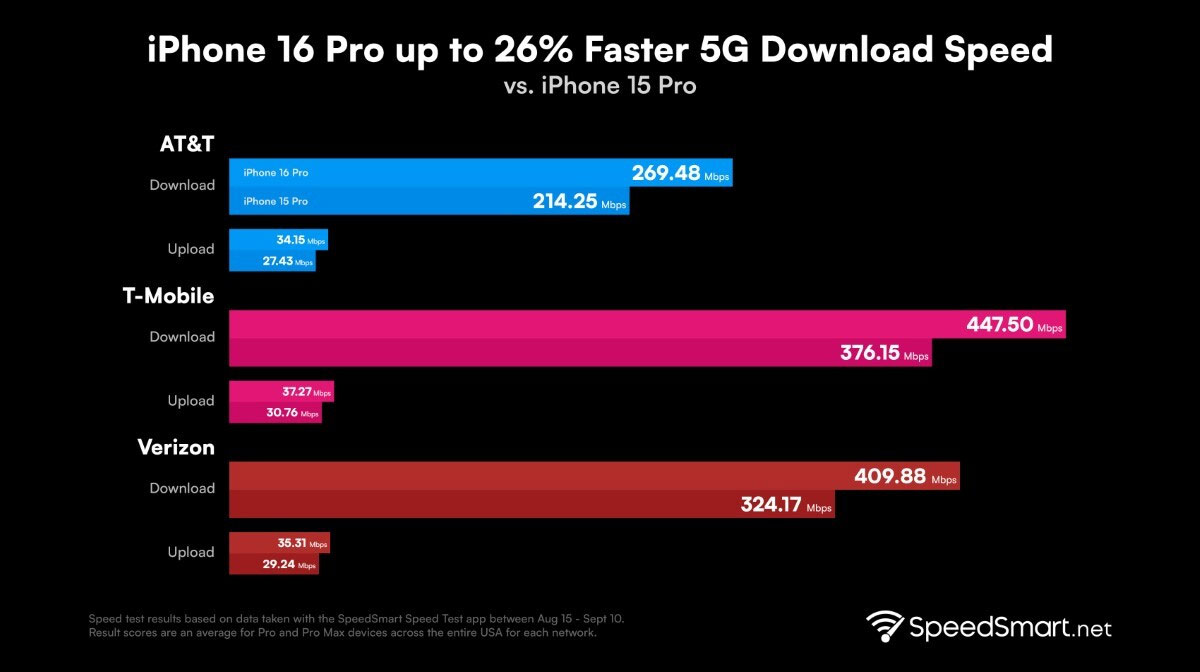iPhone 16 Pro and Pro Max offer impressive 5G speeds thanks to Qualcomm
Apple unveiled the iPhone 16 lineup at its "It's Glowtime" event on September 9, revealing four new models: the iPhone 16, iPhone 16 Plus, iPhone 16 Pro, and iPhone 16 Pro Max. While all the attention has been focused on new features like Camera Control and Apple Intelligence, there's another important upgrade that seems to have been overlooked: 5G speeds.
A recently published test has revealed that the iPhone 16 Pro and iPhone 16 Pro Max models can deliver significantly faster 5G speeds than their predecessors, to the point that it could make a noticeable difference for the average user. Notably, this improvement in 5G speeds is entirely thanks to Qualcomm's new modem.
The new iPhone 16 Pro models are powered by the Snapdragon X75 modem, which brings a number of improvements. According to tests conducted by SpeedSmart, the iPhone 16 Pro models achieved an average increase of 23.7% in 5G download speeds across all three major US carriers, including Verizon, AT&T, and T-Mobile.
Specifically, Verizon customers saw a significant improvement with a 26.4% increase in 5G speeds, followed by AT&T and T-Mobile. Both T-Mobile and AT&T networks offer impressive 5G speeds, which can exceed 400Mbps with iPhone 16 Pro models.

T-Mobile topped the download speed test with 447.50Mbps, while Verizon hit 409.88Mbps. AT&T came in third with 'just' 269.48Mbps. However, in the upload speed test, all three major carriers saw an average increase of 22.1%, with upload speeds easily surpassing the 30Mbps threshold.
Again, all of these 5G speed improvements are thanks to the new generation Qualcomm Snapdragon X75 modem, which supports advanced 5G technology, reduces power consumption, and has better 5G carrier aggregation capabilities to improve upload speeds.
It's worth noting that these significant speed improvements won't be available on the standard iPhone 16 models, as both the iPhone 16 and iPhone 16 Plus come with the older Snapdragon X70 modem.
Qualcomm is now the sole supplier of Snapdragon 5G Modem-RF Systems for Apple products to be introduced in 2024, 2025, 2026, and 2027. This means the two companies have extended their 5G modem agreement for another three years.
This new agreement is surprising because experts previously predicted that Apple would start using its own 5G modem on the iPhone in 2024. The Cupertino company has spared no expense in investing in modem technology research since 2019, when it canceled its partnership with Intel, but no notable successes have been announced.
As mentioned, Apple is likely having problems with its in-house 5G solution. The company's ongoing problems with its own 5G modems are also the reason why the iPhone SE 4 has been delayed by at least two years.
As for Qualcomm, the company has a habit of charging its partners quite a bit of money for being the exclusive supplier of a particular component. So it's no wonder that Apple has been trying to 'break away' from Qualcomm in the 5G modem space, but the results have so far been disappointing. In 2022, cooperation agreements with Apple are estimated to account for 21% of Qualcomm's total revenue.
You should read it
- ★ Qualcomm launches Wi-Fi 7 Networking Pro - the world's largest scalable commercial Wi-Fi 7 platform
- ★ Broadcom wants to buy Qualcomm with an unprecedented 130 billion dollar deal
- ★ Detecting Qualcomm CPU errors can cause private data on the phone to leak
- ★ Qualcomm has 18 partners ready to use its 5G modem next year
- ★ The billion-dollar details of the FTC antitrust trial between Apple and Qualcomm